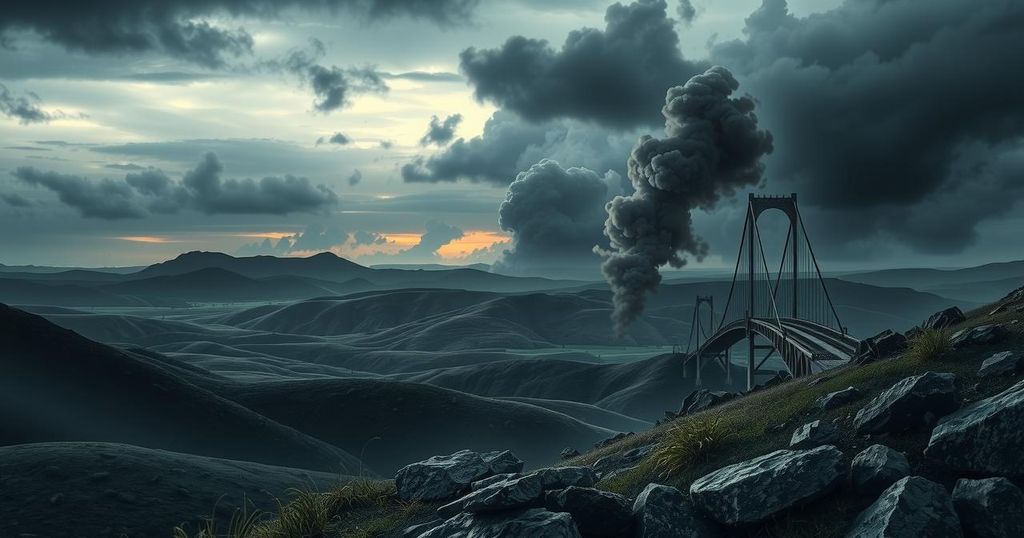A potential major conflict is emerging in the DRC, spurred by Rwanda’s military backing of the M23 rebels, which poses serious implications for regional stability. UN and international calls for Rwanda’s withdrawal have been issued amid civil unrest in response to the crisis, underscoring Western powers’ complacency. The historical context reveals a series of Rwandan interventions tied to resource extraction and ethnic tensions, complicating diplomatic efforts.
A significant new conflict is imminent, compounded by Western support for Rwanda, which is exacerbating tensions in Africa. The recent offensive by the M23 rebels in the Democratic Republic of the Congo (DRC) escalates an ongoing crisis, revealing Western governments’ negligence. Accusations from Congolese citizens highlight that international powers may be unintentionally aiding the turmoil.
The M23 rebellion, emerging in 2021, has increasingly threatened Goma, a vital city near the Rwandan border. UN Secretary-General António Guterres urged Rwanda to cease military backing for M23 and withdraw its forces from Congolese territory, noting that the conflict has severely impacted civilians in dire need of assistance. The anger among Congolese citizens resulted in violent protests targeting Rwandan and Western embassies.
Historically, Rwandan intervention in DRC has persisted for three decades, often justified as protecting the Tutsi ethnic group against ethnic violence. However, the broader implications of these conflicts involve significant resource exploitation, with Rwanda-backed rebels previously controlling eastern DRC. The M23 emerged as the latest faction amidst ongoing disputes over power and resource control in the region.
Western diplomats have often overlooked substantial evidence of Rwandan military involvement in DRC during previous conflicts. Paul Kagame, the Rwandan president, has maintained Western support despite troubling allegations. Aid dependency persists, with a substantial portion of Rwanda’s budget still reliant on foreign donations after temporary halts in support due to incriminating evidence.
Under President Felix Tshisekedi, attempts were made to collaborate with Rwanda against Hutu rebels linked to the 1994 genocide. However, M23’s resurgence disrupted efforts, escalating tensions significantly after stalled negotiations regarding reintegration into Congolese governance. As Rwanda strengthens its ties with the West, DRC faces an increasingly precarious situation.
The Congolese government seeks aid from a diverse array of military partners, including UN troops and ethnic militias previously under Rwandan attack, while some volunteer forces have surrendered. Growing concerns emerge regarding potential Russian involvement, drawing parallels with previous geopolitical conflicts.
Recognizing the risk of further escalation into a broader regional crisis, Western powers must leverage remaining influence. Political negotiations are essential to mitigate the recurring cycle of violence in DRC. Failure to address these complexities may lead to the reemergence of past conflicts and allow foreign powers to exploit the instability.
The Democratic Republic of the Congo (DRC) has faced a series of conflicts deeply rooted in historical ethnic tensions and struggles for territorial control, particularly involving Rwandan influences. The geopolitical dynamics are shaped by relationships between local leaders and foreign nations, leading to complex interdependencies. The M23 rebel group, a symptom of ongoing instability, originates from earlier conflicts and represents the challenges that DRC continues to face in governance and sovereignty.
The unfolding conflict in the DRC necessitates immediate attention from international powers to prevent regional destabilization. As the M23 rebellion escalates with backing from Rwanda, the responsibility of addressing underlying issues lies with Western governments. Only through decisive diplomatic efforts and support for political dialogue can a resolution be achieved to halt the cycle of violence and protect civilian lives.
Original Source: www.theguardian.com






